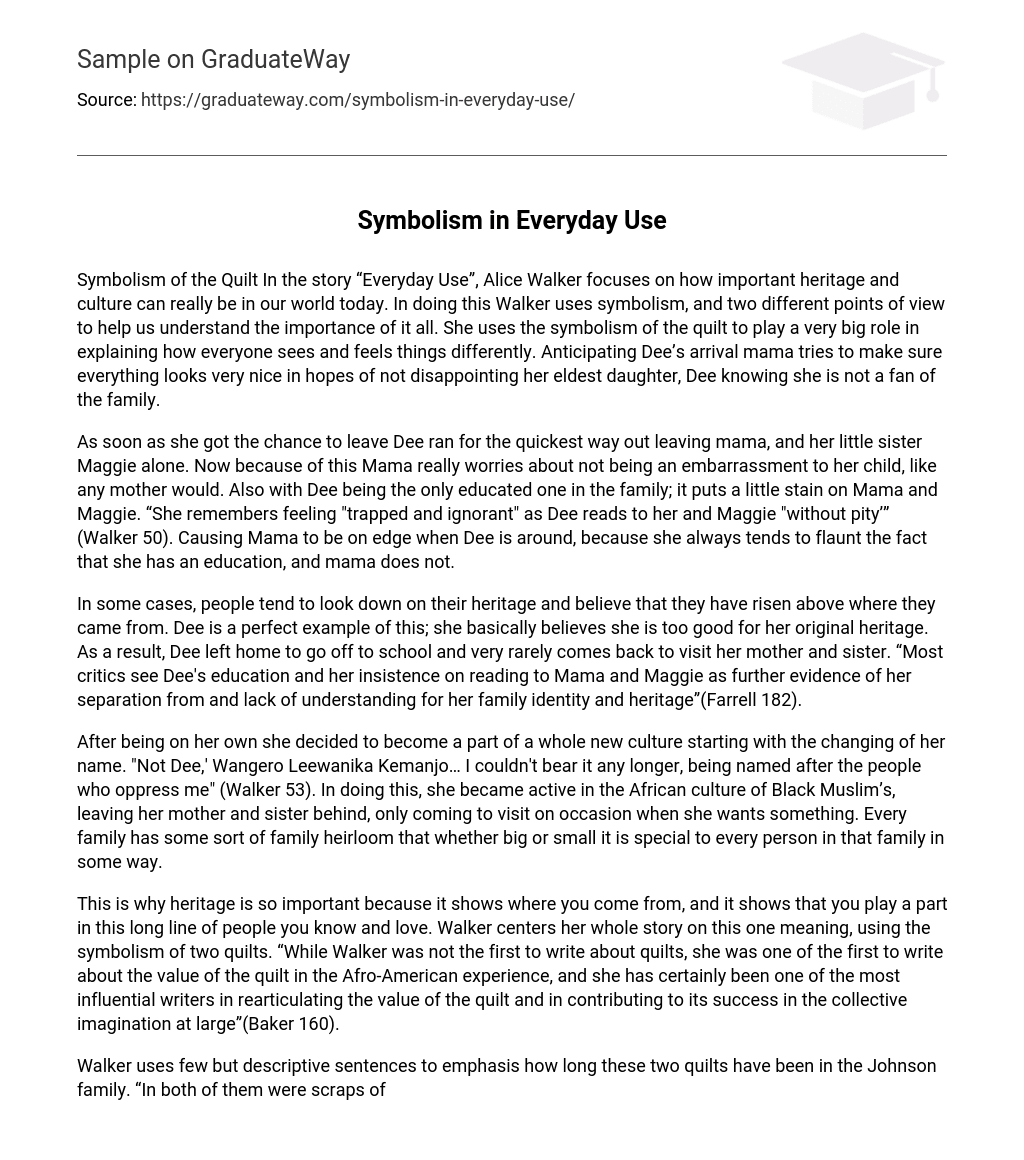Symbolism of the Quilt In the story “Everyday Use”, Alice Walker focuses on how important heritage and culture can really be in our world today. In doing this Walker uses symbolism, and two different points of view to help us understand the importance of it all. She uses the symbolism of the quilt to play a very big role in explaining how everyone sees and feels things differently. Anticipating Dee’s arrival mama tries to make sure everything looks very nice in hopes of not disappointing her eldest daughter, Dee knowing she is not a fan of the family.
As soon as she got the chance to leave Dee ran for the quickest way out leaving mama, and her little sister Maggie alone. Now because of this Mama really worries about not being an embarrassment to her child, like any mother would. Also with Dee being the only educated one in the family; it puts a little stain on Mama and Maggie. “She remembers feeling “trapped and ignorant” as Dee reads to her and Maggie “without pity’” (Walker 50). Causing Mama to be on edge when Dee is around, because she always tends to flaunt the fact that she has an education, and mama does not.
In some cases, people tend to look down on their heritage and believe that they have risen above where they came from. Dee is a perfect example of this; she basically believes she is too good for her original heritage. As a result, Dee left home to go off to school and very rarely comes back to visit her mother and sister. “Most critics see Dee’s education and her insistence on reading to Mama and Maggie as further evidence of her separation from and lack of understanding for her family identity and heritage”(Farrell 182).
After being on her own she decided to become a part of a whole new culture starting with the changing of her name. “Not Dee,’ Wangero Leewanika Kemanjo… I couldn’t bear it any longer, being named after the people who oppress me” (Walker 53). In doing this, she became active in the African culture of Black Muslim’s, leaving her mother and sister behind, only coming to visit on occasion when she wants something. Every family has some sort of family heirloom that whether big or small it is special to every person in that family in some way.
This is why heritage is so important because it shows where you come from, and it shows that you play a part in this long line of people you know and love. Walker centers her whole story on this one meaning, using the symbolism of two quilts. “While Walker was not the first to write about quilts, she was one of the first to write about the value of the quilt in the Afro-American experience, and she has certainly been one of the most influential writers in rearticulating the value of the quilt and in contributing to its success in the collective imagination at large”(Baker 160).
Walker uses few but descriptive sentences to emphasis how long these two quilts have been in the Johnson family. “In both of them were scraps of dresses Grandma Dee had worn fifty and more years ago. Bits and pieces of Grandpa Jattell’s Paisley shirts, and one teeny faded blue piece, about the size of a penny matchbox, that was from Great Grandpa Ezra’s uniform, that he wore in the Civil War” (Walker 50). In a lot of ways Dee is making fun of where she truly comes from, she is very selfish when it comes to people’s feelings and emotions. Such a reading condemns the older, more worldly sister, Dee, as “shallow,” “condescending,” and “manipulative,” as overly concerned with style, fashion, and aesthetics, and thus as lacking a “true” understanding of her heritage” (Farrell 180). For example, when she says she wants all of these things from her mother’s house to take home with her. She does not even consider whether or not her younger sister might want a few of her great grandmother’s and grandmother’s things. The only reason she wants these items is for the simple fact that she wants them to show how far she has come in life, and how she has made something of herself. Wangero has realized the dream of the oppressed: she has escaped the ghetto” (Cowart 172). Showing the reasoning behind the fact that she thinks the quilts should be hung up somewhere instead of being put to everyday use. Having heard enough of Dee’s plea mama decided to put an end to the conversation. “I did something I never done before: hugged Maggie to me, then dragged her on into the room, snatched the quilts out of Miss Wangero’s hands and dumped them into Maggie’s lap”(Walker 53).
Therefore, Walker uses all these instances to get the point across that heritage is a part of you no matter how hard you try to deny it. Walker also uses two completely different character points of view, to give pleasant depth in the story. Having a daughter who’s too good for her family, in addition to having one that does not let the world change who she is and really values the little things like quilts made by her ancestor’s clothing. This situation was made very relatable to the average person, allowing it to be easy to follow along ith, and also making the story enjoyable to read. Throughout this whole story, Walker talks about an old family heirloom of quilts and their significant to the Johnson family. She talks about how some appreciate them and how others just consider them another piece of art in a gallery. Making you wonder which person you would be in this situation. Whether it be the one that just hangs the quilts up for everyone to see as a piece of art or the one that puts them to everyday use.





